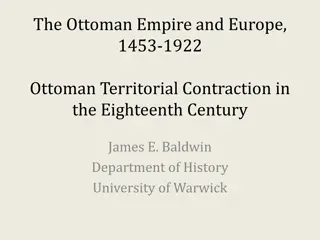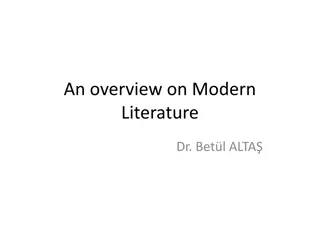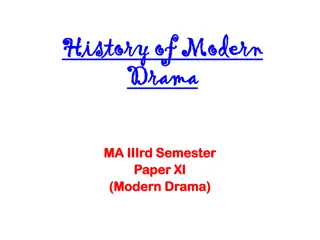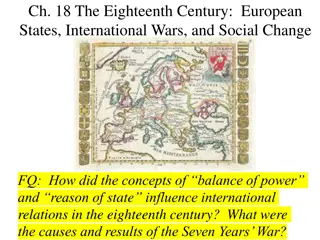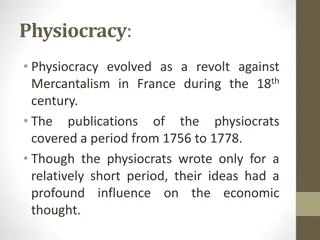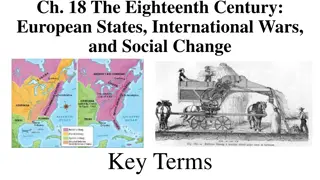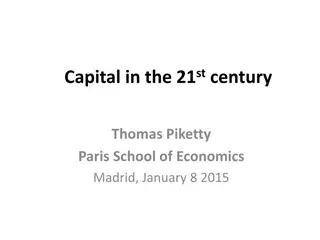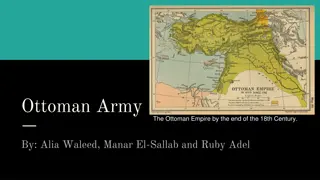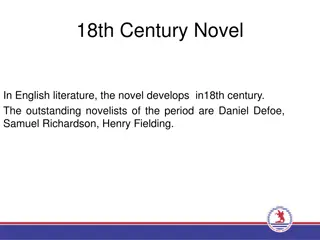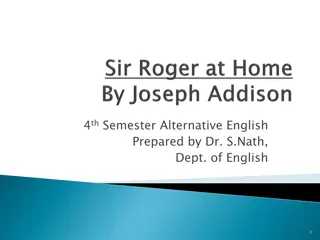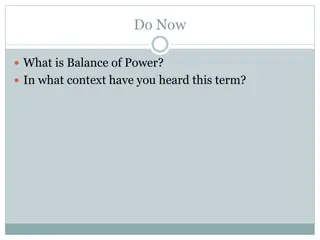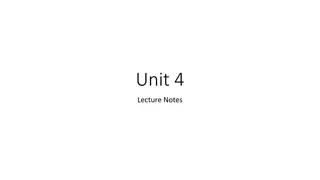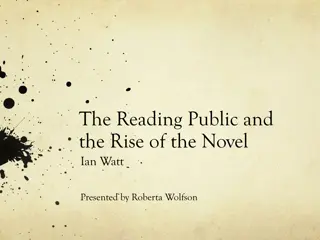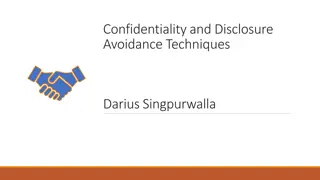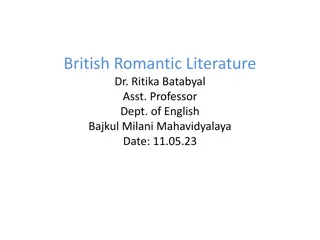Exploring English Literature from the 18th Century to Modern Times
This course focuses on major literary movements from the 18th century to modern times, examining the history of modern literature and exploring overlapping trends and traditions. Students will critically analyze historical texts, write organized critical essays, understand word structures, and grasp underlying meanings. The content covers the Classical Age of English literature including the Ages of Dryden, Pope, and Dr. Johnson.
Download Presentation

Please find below an Image/Link to download the presentation.
The content on the website is provided AS IS for your information and personal use only. It may not be sold, licensed, or shared on other websites without obtaining consent from the author. Download presentation by click this link. If you encounter any issues during the download, it is possible that the publisher has removed the file from their server.
E N D
Presentation Transcript
SEMESTER III COURSE TITLE: A HISTORY OF ENGLISH LITERATURE FROM 18THCENTURY-MODERN TIMES(CONTENT ELECTIVE) COURSE CODE: EC/ENG/B.EDS- 201
COURSE DESCRIPTION AND LEARNING OUTCOMES Course Description: The Course will focus on some of the major literary movements of the 18thcentury till modern times. The history of modern literature with a perspective to explore overlapping major literary trends and traditions of the time will be focused. This course also examines historical survey of Modern drama, fiction and poetry. Learning Outcomes The students will read historical texts critically. Write well-organized critical texts with complete understanding of historical background. They will also understand the real structure of words. Develop an understanding of the underlying meaning of the words as well.
UNIT 1 EIGHTEENTH CENTURY LITERATURE What is eighteenth century literature or Age of Reason? The Eighteenth Century in England is called the Classical Age or the Augustan Age in literature. It is also called the Age of Good Sense or the Age of Reason. Though Dryden belonged to the seventeenth century, he is also included in the Classical or Augustan Age, as during his time the characteristics of his age had manifested themselves and he himself represented them to a great extent. Other great literary figures who dominated this age successively were Pope and Dr. Johnson, and so the Classical Age is divided into three distinct periods the Ages of Dryden, Pope and Dr.Johnson. In this chapter which is devoted to the eighteenth-century literature in England, we will deal with the Ages of Pope and Johnson.
REASONS WHY IT IS TERMED AS CLASSICAL AGE The Eighteenth Century is called the Classical Age in English literature on account of three reasons. In the first place, the term classic , refers in general, applies to writers of the highest rank in any nation. This term was first applied to the works of the great Greek and Roman writers, like Homer and Virgil. As the writers of the eighteenth century in England tried to follow the simple and noble methods of the great ancient writers, they began to be called Classical writers. In the second place, in every national literature there is a period when a large number of writers produce works of great merit; such a period is often called the Classical Period or Age. For example, the reign of Augustus is called the Classical Age of Rome; and the Age of Dante is called the Classical Age of Italian literature.
In the third place, during this period the English writers rebelled against the exaggerated and fantastic style of writing prevalent during the Elizabethan and Puritan ages, and they demanded that poetry, drama and prose should follow exact rules. The eighteenth century is called the Classical Age, because the writers followed the classicism of the ancient writers, which was taken in a narrow sense to imply fine polish and external elegance. But as the eighteenth century writers in England followed the ancient classical writers only in their external performance, and lacked their sublimity and grandeur, their classicism is called pseudo-classicism i.,e., a false or sham classicism.
AGE OF REASON OR AGE OF GOOD SENSE The eighteenth century is also called the Age of Reason or the Age of Good Sense, because the people thought that they could stand on their own legs and be guided in the conduct of their affairs by the light of their own reason unclouded by respect for Ancient precedent. They began to think that undue respect for authority of the Ancients was a great source of error, and therefore in every matter man should apply his own reason and commonsense. It was widely assumed during the eighteenth century that since every man is competent to decide, by reference to his own reason, on any point of natural or moral philosophy, every man becomes his own philosopher. So the need of the expert or specialist vanishes. Moreover, as all men were assumed to be equally endowed with the power of reasoning, it followed that when they reasoned on any given premises they must reach the same conclusion.
This was the temper of the eighteenth century. If it is called The Age of Reason or The Age of Good Sense, it is because in this age it was assumed that in reasoning power all men are and have always been equal. It was an age which took a legitimate pride in modern discoveries based upon observation and reason, and which delighted to reflect that those discoveries had confirmed the ancient beliefs that there is an order and harmony in the universe, that it is worked on rational principles, that each created thing has its allowed position and moved in its appointed spheres. It was, in short, an age which implicitly believed in the Biblical saying: God saw everything that He had made, and behold it was very good.
PROSE V/S POETRY As it was the age of social, political religious and literary controversies in which the prominent writers took an active part, and a large number of pamphlets, journals and magazines were brought out in order to cater to the growing need of the masses who had begun to read and take interest in these controversial matters, poetry was considered inadequate for such a task, and hence there was a rapid development of prose. In fact the prose writers of this age excel the poets in every respect. The graceful and elegant prose of Addison s essays, the terse style of Swift s satires, the artistic perfection of Fielding s novels, the sonorous eloquence of Gibbon s history, and the oratorical style of Burke, have no equal in the poetical works of the age. In fact, poetry also had become prosaic, because it was no longer used for lofty and sublime purposes, but, like prose, its subject-matter had become criticism, satire, controversy and it was also written in the form of the essay which was the common literary form.
DEVELOPMENT OF NOVEL Another important feature of this age was the origin and development of the novel. This new literary form, which gained great popularity in the succeeding ages. As the eighteenth century is a long period, it will be dealt with in different chapters entitled The Age of Pope, The Age of Johnson, Eighteenth Century Novel and Eighteenth Century Drama.




